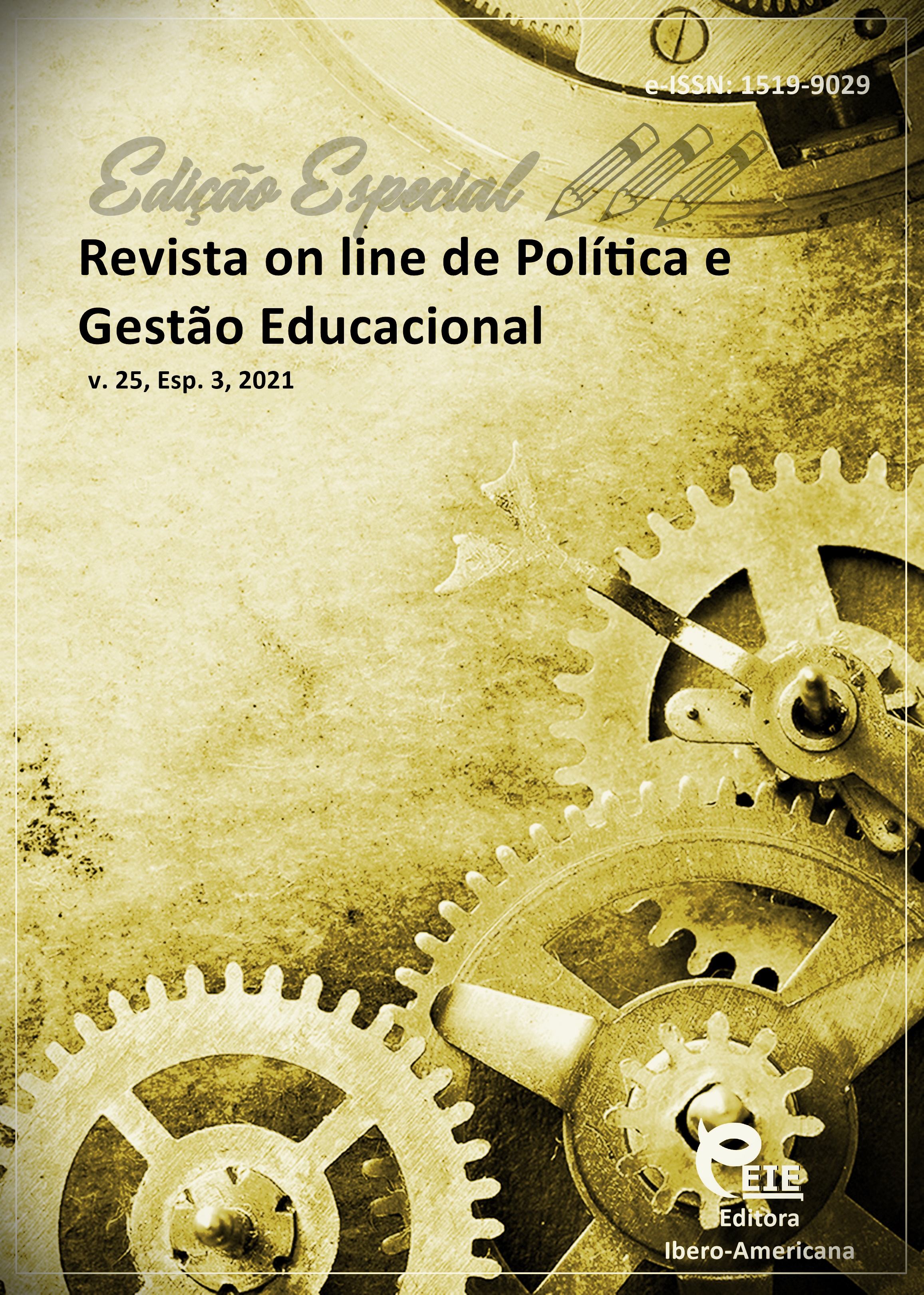Direcciones de formación de valores humanísticos en superior instituciones educativas: problemas y perspectivas
DOI:
https://doi.org/10.22633/rpge.v25iesp.3.15581Palabras clave:
Instituciones de educación superior, Valores humanistas, Estudiantes, Direcciones principales, Perspectivas en la educaciónResumen
El artículo analiza las direcciones de la formación de valores humanistas en las instituciones de educación superior. Los resultados del estudio mostraron que los estudiantes tienen una alta actitud hacia los valores humanistas, independientemente del nivel de autoafirmación y autoestima. Los principales mecanismos de formación de los valores humanistas en los estudiantes dependen de los rasgos provocadores de los valores sociales, que ocupan un lugar dominante en la jerarquía de valores y la autoconfianza profesional, que refleja las cualidades integradas del individuo. Se encontró que existe una correlación positiva entre cualidades humanísticas y cualidades personales y logros académicos. Existe una conexión importante entre la autoconciencia, la autoestima, la autoafirmación y un ideal social que refleja cualidades humanistas en los estudiantes. Se puede concluir que para desarrollar valores humanistas, es necesario desarrollar valores socialmente importantes y rasgos de personalidad. Aquí es necesario tener en cuenta las necesidades cognitivas, las oportunidades de autoafirmación, así como los logros de aprendizaje.
Descargas
Citas
AZERBAIJCA FOLKLORE, (2005). Baku, Qanun.
ALONI, N. Humanistic education: From theory to practice. In: W. Veugelers (Ed.), Education and humanism: Linking autonomy and humanity Rotterdam, Netherlands: Sense Publishers. 2011.
BROCETT, R.G. Humanism as an instructional paradigm. 1998. Available: http://roghie mstr a.¬com/romira1.html
DIERKSMEIER, C. What is ‘Humanistic’ About Humanistic Management?. Humanist Management Journal, 1, 9–32 2016; Available: https://¬link.spri¬nger.c¬om/art¬ic¬le/10-.1007/s41463-016-0002-6
DE GROOT, I. Why we are not democratic yet: The complexity of developing a democratic attitude. Rotterdam, Netherlands: Sense Publishers. 2011.
EFFENDI, R.; BAFADAL, I.; NYOMAN, D.; ARIFIN, I. The Construction Model of Inculcating Principal Humanistic Values in Forming a Characteristic School Environ-ment. Preprints Posted: 2, 19, 21-43, 2020. DOI: 10.20944/p¬reprints20¬2011¬.0068.v1).
JABBAROV, R. Factors affecting the development of self-realization among students of different professions. Science and Education, 9, 75-87. 10.24195/2414-4665, 2018. Available: https://s¬cience¬andeduc¬ation¬.pdpu.¬edu.ua/en¬/article¬s/2017¬-¬9-doc¬/¬20¬17¬-¬9-st12-en
MASLOW, A. Motivation and personality. Moscow, Peter. 2018.
MELE, D. Understanding Humanistic Management. Humanistic Management Journal, 1(1), 33-55. 2016. DOI: 10.1007/s41463-016-0011-5
MILLER, M. D.; GREKSON, J. A. A philosophic view for seeing the past of vocational education and envisioning the future of workforce education: Ann Arbor, MI: Prakken. 1999.
NEMIROFF, G. H. Reconstructing education: Toward a pedagogy of critical humanism. New York, NY: Bergin & Garvey. 1992.
ROKEACH, M. Beliefs, attitudes and values: a theory of organization and change. Jossey-Bass, San Francisco, California, USA. 1968.
PARI NAZ P.; MARYAM N.; EZATOLLAH N. Humanistic Education and students’ Educational Motivation in Tehran Primary Schools. International Journal of Mental Health and Addiction, 15, 312–322. 2017. Available: https://link.¬sprin¬ger.c¬om/¬art¬icle/10.1¬007/s11-469-016-9703-1
PENG C.; CARSTEN. S. Humanistic Elements in the Educational Practice at a United States Sub-Baccalaureate Technical College // International Journal for Research in Vocatio¬nal Education and Training (IJRVET), Vol. 4, Issue 2, August 2017, 117-145. DOI: 10.13152/IJRVET.4.2.2
SCHWARTZ, S. Values: individual and cultural. Pages 463-493. In: F. J. R. van de Vijver, A. Chasiotis, and S. M. Breugelmans, edit¬ors. Fund¬amental questions in cross-cultural psychology. Cambridge University Press, Cambridge, UK. 2010. Available: http://dx.doi-.org/10¬.¬1017¬/c¬bo978051¬19740¬90.019
SCOTT, P. Individualizing vocational education. VA: American Vocational Association. 1980.
SEYIDOV, S. I. Phenomenology of Creativity. Baku: Chashigoglu. 2009.
SHOSTROM, E. Man-manipulator. The inner journey from manipulation to actualization. Kiev; PSYLİB. 2003.
VEUGELERS, W. A humanist perspective on moral development and citizenship education. Rotterdam, Netherlands: Sense Publishers. 2011.
WILLIIAM T. Teaching professional and humanistic values: Suggestion for a practical and theoretical model, Patient Education and Counseling, 98, 2.162-167. 2015. DOI: //doi. org/10.1 016/j.pec 2014.10.022
WADDOCK, S. Developing Humanistic Leadership Education. Humanist Man¬age¬ment Journal, 1, 57–73, 2016. 10.1007/S41463-016-0003-5
Publicado
Cómo citar
Número
Sección
Licencia
Derechos de autor 2021 Revista on line de Política e Gestão Educacional

Esta obra está bajo una licencia internacional Creative Commons Atribución-NoComercial-CompartirIgual 4.0.
Manuscritos aceitos e publicados são de propriedade da Revista on line de Política e Gestão Educacional. É vedada a submissão integral ou parcial do manuscrito a qualquer outro periódico. A responsabilidade do conteúdo dos artigos é exclusiva dos autores. É vedada a tradução para outro idioma sem a autorização escrita do Editor ouvida a Comissão Editorial Científica.











